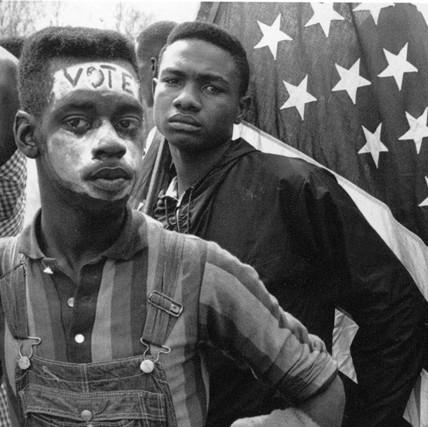The right to vote has always been fundamental to our system of representative democracy, yet most African-American voters in southern states were denied this right for almost a hundred years, despite the ratification of the 15th Amendment in 1870. Southern voter registration boards imposed overwhelming bureaucratic impediments to qualified black voters and subjected them to harassment, economic reprisals and physical violence. With their voices unheard, they had little, if any, political power.
选举权一直是代议民主体系的基础,然而美国南部各州大部分的非裔选民却不被赋予这一基本权利,尽管1870年第15项修正案批准了选举权利法案,但这种状况仍持续了近一百年。南方选民注册委员会对合格的黑人选民施加了压倒性的官僚障碍,包括骚扰,经济报复和身体暴力等手段。因为统治阶级无视选民的呼声,所以他们没有任何政治权利。

In early 1965, during the Civil Rights Movement, peaceful demonstrators in Birmingham and Selma, Alabama were met with violent police resistance, including nightsticks, water hoses, tear gas, attack dogs, and imprisonment. Televised newscast images of these events outraged Americans, and persuaded President Lyndon B. Johnson and Congress to make voting rights legislation a priority.
在1965年早期的民权运动期间,伯明翰、塞尔玛和阿拉巴马市的和平示威者遭到防暴警察的镇压,他们用木棒、软管、催泪弹、击狗棒袭击示威者,并逮捕示威者入狱。事件一经电视播出,便激怒了美国人,这也迫使林顿·约翰逊总统和国会优先考虑选举权立法。
The Voting Rights Bill passed quickly in both houses, and was signed into law on August 6th, 1965. It gave the Federal government power to oversee the registration and election process in problematic counties. The Voting Rights Act was amended in 1970, '75, and '82, extending protection to other minorities and disenfranchised voters. Though the voting process in America continues to spark debate, the Voting Rights Act remains a significant piece of legislation, guaranteeing that no citizen will be denied the right to vote on account of race, color, or disability.
《选举权法案》很快通过两院的批准,最终于1965年8月6日签署生效。这赋予联邦政府在问题城市监督注册和选举进程的权利。1970年、1975年和1982年的选举法案修正案给予少数民族和被剥夺权利的选民以保护。尽管美国的选举程序将继续引发争论,但选举权法案仍然是一项重要立法,它确保居民不因种族,肤色和残疾而被剥夺选举权。












